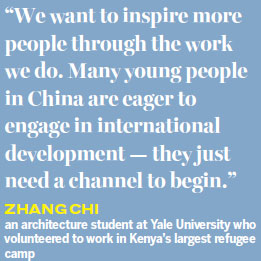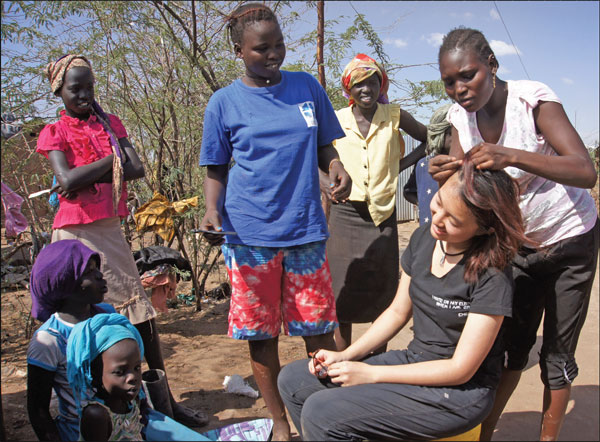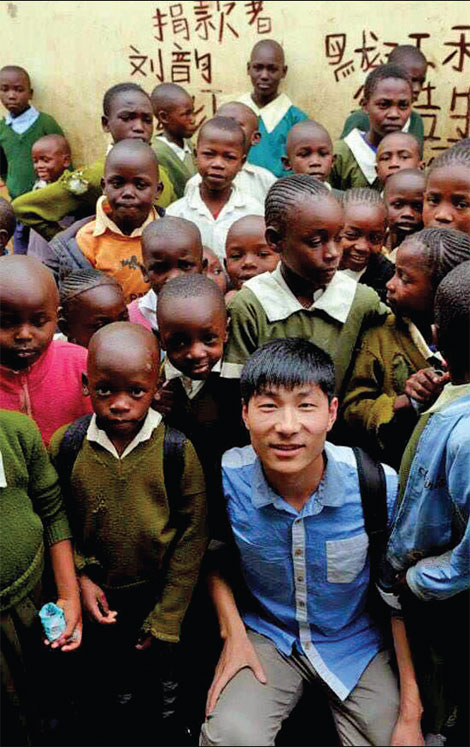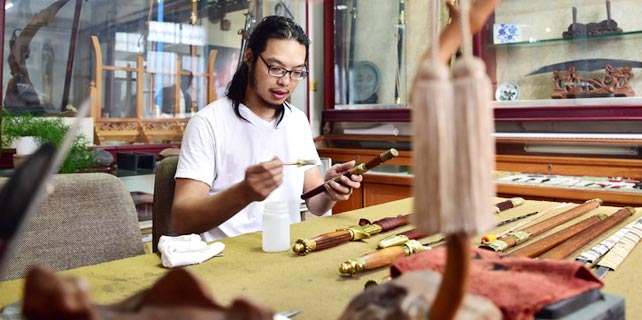Volunteers break barriers
A growing number of young kindhearted Chinese are visiting Africa as unpaid workers, engaging with people from countries across the continent
In 2014, a friend told Yin Binbin about the bleak lives of the residents of Mathare, a slum area in Nairobi, the capital of Kenya. As he listened, an idea occurred to Yin, then a sophomore at Shandong University in East China: He would volunteer to work in a school in the ghetto.
He never expected that his idea would bind him and children of the slums together for a prolonged period.
However, in the past three years, Yin and his peers, mostly college students, have raised more than 300,000 yuan ($43,570; 40,880 euros; £34,790) to rebuild two primary schools in Mathare. In addition, a "free lunch" program they launched with a Chinese NGO has helped more than 1,100 children in the poverty-stricken area, which has a population of about 500,000.
|
Zhang Chi enjoys a makeover in Kakuma, the largest refugee camp in Kenya. |
|
Yin Binbin with children in Mathare, a poverty-stricken area in Nairobi, the capital of Kenya. Photos Provided to China Daily |
Despite China's growing economic presence in Africa, there has been a lack of engagement between the general public and their counterparts on the continent, according to experts. Now, young Chinese such as Yin are endeavoring to change the situation.
Despite his early enthusiasm, Yin was shocked by the terrible conditions at the Light Center primary school in Mathare. About 300 students were crowded into a stuffy, somber shed of no more than 180 square meters. There was no electric light, so Yin tried to reflect sunshine into the classroom by filling transparent bottles with water and placing them in a hole in the roof. The experiment failed, so the volunteers used the flashlights on their smartphones to help the students see what had been written on the blackboard.
The worst time every day was when the teachers cooked, because the shed, which was made from rusty sheets of iron, would be engulfed by smoke, making the children's eyes sting.
Transformation
Depressed by the conditions, Yin, who was majoring in architecture, decided to transform the ramshackle school. With the help of social media, he and three other Chinese students raised 70,000 yuan in a week. They used the money to redesign the building. They purchased construction materials, guided workers with limited construction experience and built a new school.
The new facility won acclaim from the local community, and when someone asked Yin why he hadn't made school renovation a long-term project, he decided to launch the Dream Building Service Association.
The association raised a further 270,000 yuan and rebuilt a second school in 2015. Last month, it partnered with Deng Fei, who started the Free Lunches for Children in Rural China program, to provide meals for 1,103 students in five schools in the slum. They plan to expand the project to other schools in Mathare.
As well as building schools, the association has organized talent shows, art exhibitions and soccer tournaments to enrich the children's lives. Last year, a soccer tournament attracted 600 students from 20 schools, and more than 1,000 children displayed their works of art at an exhibition organized by the association, which is attracting a growing number of Chinese volunteers.
The association now has five full-time employees in Kenya, and about 70 volunteers arrive from China to help each year. An additional 69 contribute via the internet, according to Yin.
Other young Chinese have also rolled up their sleeves to help people in Kenya. Yuan Xiaoyi, a 21-year-old student at New York University, and three other female Chinese students founded an NGO, Care for All Kids, after Yuan volunteered to work in the country in 2013. The organization provides low-cost training for teachers from "informal", or unofficial, schools. Last year, the NGO organized training for teachers at more than 120 schools in Kenya.
Meanwhile, Zhang Chi, 22, an architecture student at Yale University, collaborated with refugees to set up a school when she volunteered to work in Kakuma, the largest refugee camp in Kenya.

"We want to inspire more people through the work we do. Many young people in China are eager to engage in international development - they just need a channel to begin," she says.
Expanding exchanges
Despite the efforts of young Chinese to connect with people in Africa, there is still not enough contact between the groups, according to experts.
Janet Eom, research manager of the China Africa Research Initiative at Johns Hopkins University in the United States, says the Chinese public has not yet caught up with the country's growing economic engagement in Africa, even though Confucius Institutes teach Mandarin and Chinese culture and volunteers help with health programs. For example, Chinese medical teams worked on the Ebola crisis, and training programs for local workers are emerging via Chinese agricultural and manufacturing projects across Africa.
"I think that in contrast to Chinese companies and investors, the general public in China is less aware of opportunities in Africa," Eom says.
Isaac Kwaku, chairman of the Sino-Africa Centre of Excellence Foundation in Kenya, says: "To our knowledge, there is not yet a significant presence of regular Chinese citizens on the ground in Africa. However, some organizations are doing an excellent job of expanding exchanges."
He says the center has worked with AIESEC, one of the world's leading nonprofit, student-run organizations, and with student associations at Peking University and the University of Hong Kong to bring students to Africa as interns.
"Based on the number of internship applications we receive every year, the number of Chinese students going to Africa as interns or volunteers is definitely rising," he says. "There has been a change in the interests of Chinese youth. Originally, the projects that brought young people to Africa were wildlife conservation or volunteer programs in informal settlements. Then, an increasing number of students became interested in researching different topics in Africa, and then in internships," he says.
According to Kwaku, there are still some obstacles to the promotion of mutual exchanges between Africa and China. One of them is "the lack of understanding of Africa as a continent, more than poverty, disease and wildlife. When young people come only for 'poverty tourism', they will never fully understand the dynamics and potential of the development of Africa and China-Africa ties."
Some Chinese NGOs have tried their hand at programs in Africa as well.
In June, when Zction, an NGO that mainly involves college students in China, tried to organize its first African volunteer program, the move attracted great attention. "Quite a lot of people signed up for it," says Lin Qianru, head of the organization's Shanghai branch.
The NGO arranged interviews and chose the 32 best-qualified candidates, but only six made the trip to Uganda, where they had volunteered to teach in a school. "Most quit because of parental opposition prompted by safety concerns," says Lin, a student at Shanghai International Studies University, who also met opposition to her trip.
"Although my parents, uncles and aunts were concerned for my safety, they showed support. I experienced more opposition from people of my grandfather's generation," she says, adding that seniors have an entirely different impression of Africa than younger people do.
"The village we stayed in is safe and the villagers are honest. We will have more programs in Africa soon," she says.
Guo Xiaojun contributed to this story.
houliqiang@chinadaily.com.cn
(China Daily Africa Weekly 04/21/2017 page16)
























